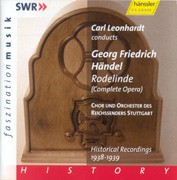"Rodelinde" (a)
(Rodelinda, regina de'
Langobardi, HWV 19)
|
|
Rodelinde:
Cäcilie Reich Bertarich: Gerhard Hüsch Grimwald: Fritz Krauss Hadwig: Emma Mayer Garibald: Hans Ducrue
Includes:
Georg A. Walter, tenor (c) Marta Fuchs, soprano (d) Chor des SWR (a) Chor des Reichssenders Stuttgart (a) Orchester des Reichssenders Stuttgart (on 'modern' instruments) (a, b, c, d) Carl Leonhardt (a), Gustav Görlich (b, d), Fritz Lehmann (c) |
